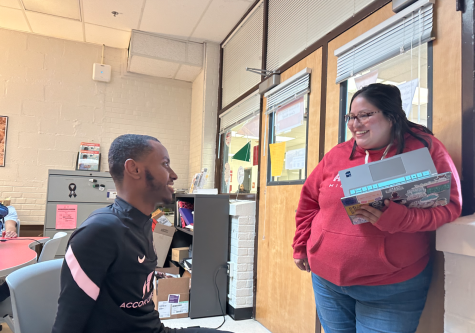Stop rushing to finish your meals
Eating for less than 30 minutes is harmful in the long run

It is common for students to rush to finish their lunch in order to have more time to do homework.
With such busy schedules, students as well as teachers oftentimes do not take the proper time to sit down and eat their food. Meals are instead viewed as burdens and only take away from time that could be spent being productive.
As a result, important meals like lunch and dinner are wolfed down in five to ten minutes, not even close to the adequate amount of time needed for food to travel down your digestive system.
According to WebMD, eating too fast can lead to a series of complications including irritable bowel syndrome, arthritis and heart disease. These problems will prevent you from having a comfortable day as abdominal pain, constipation, diarrhea, indigestion and nausea are only some of the symptoms.
They also found that it takes approximately 20 minutes for your brain to send signals of fullness so eating too fast will confuse your body as to whether or not you are full.
An adult digestive tract is approximately 30 feet long and five minutes is clearly not enough time for food to make its way down your system.
Inhaling your food at these fast rates will force your digestive tract to fasten its pace in order to get all into your stomach without getting backed up.
When people are in a rush to finish their food, chewing is ignored and results in undigested food traveling down to your stomach. This ultimately causes distress for your system, making it harder for your body to break down the food you eat.
As a result, the necessary nutrients in the food won’t be properly absorbed into your body because the large chunks of unchewed food are harder to process. Ultimately, your body will react negatively to the lack of nutrients.
Eating too fast will also take a toll on your bowel movements. Shoving food down your throat will only result in your brain telling your digestive system to slow down.
The abrupt changes and inconsistency of your digestive system will either leave you with multiple trips to the bathroom or weeks of constipation.
Junior Amy Chung explained that she has even skipped meals to complete homework but only at the cost of her own health.
“[Rushing to eat] makes me more tired while I’m doing my homework,” Chung said.
This problem is not rare among students as most of them deem themselves ‘too busy’ to eat. They begin to prioritize their time towards school work rather than their own health, taking less than half an hour to consume their meals.
Both senior Remmy Salinas and junior Vidhi Phadumdeo stated that they merely take 15 minutes to eat lunch which is clearly not enough time for your body to process food. Instead of using the allotted 30 minutes the school gives for lunch, some students use half of that time to eat and use the remaining lunch period to head to the library or back to class in order to study or get work done.
Everyone has work to get done and people to see, but taking the time to sit down and have a proper meal for 30 minutes is extremely important.
Even knowing this fact, some students go to even more extreme measures of completely skipping their meals instead of rushing to eat.
“I generally don’t eat lunch or breakfast because I’m doing homework in the morning and during lunch,” Phadumdeo said. “I’ve done it for so long my body has gotten used to it. At this point I don’t feel any different and I can’t eat normally anymore.”
Of course, maybe those extra 30 minutes you spent eating could have allowed you to finish a school project but those minutes will only contribute to keeping your body healthy.
Overall, mealtime should be the most important portion of your day and speeding through your lunch or dinner clearly has negative effects in the long run.
What is the point of preparing a meal for yourself if you can’t even take the time to appreciate it?
There is no reason to eat your food in record time, no one is racing you to the finish line. Instead, slow down and take the time to enjoy your food one bite at a time. Your papers and homework can wait, but your health cannot.
Make sure you’re allotting at least 30 minutes per meal in order to avoid any health complications. Sit down, relax and eat your food at a normal pace, one bite at a time.

Active member in various honor societies and clubs, senior Julie Nguyen has been on The A-Blast staff for three years. She is currently the Health Editor...





